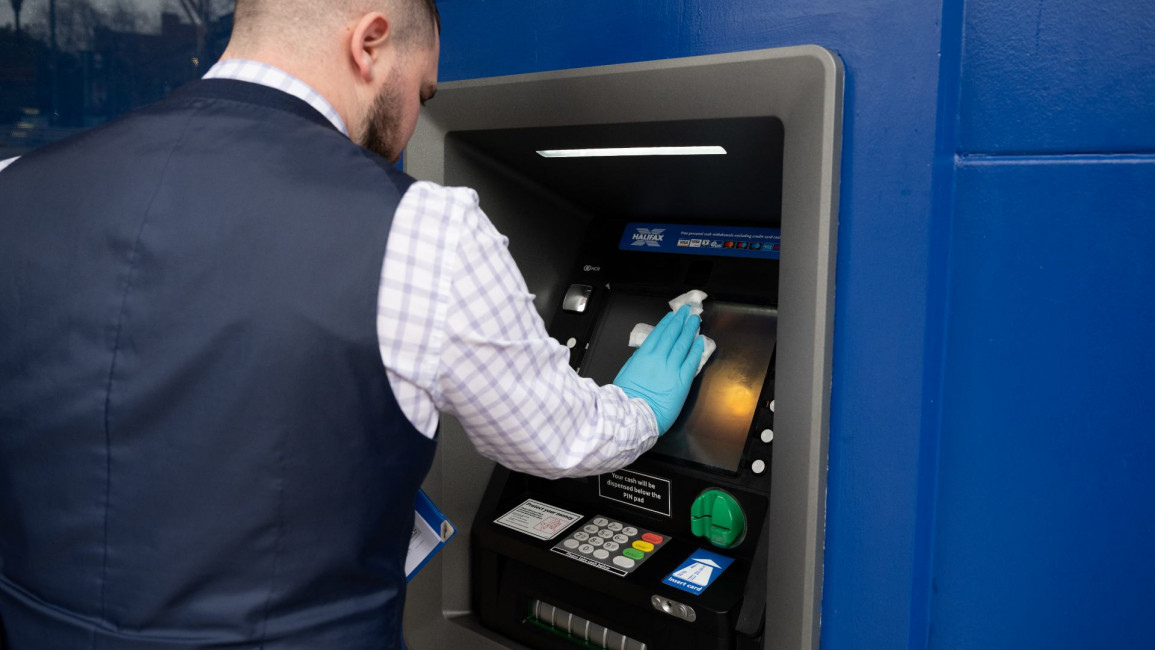Turkish start-up develops money-cleaning ATM to counter coronavirus spread
Turkish start-up develops money-cleaning ATM to counter coronavirus spread
The Covid-19 pandemic has sparked worries that using cash could spread the novel coronavirus.
2 min read
Many businesses have shunned paper money in the wake of the novel coronavirus [Getty]
A Turkish start-up has developed a module for ATMs that can remove bacteria and viruses from paper money amid the coronavirus pandemic.
Istanbul-based tech company Money Shower says the new module disinfects paper bills within 15 minutes, Hurriyet Daily News reported.
"There are now 26,000 bacteria of 500 types on average on banknotes circulating in Europe. These numbers are enough to make people sick," Furkan Erucan, co-founder of Money Shower, told state news agency Anadolu.
The company's "instant disinfection technology" using ultra-violet light has already been sold to one of Turkey's leading banks, Erucan said.
After pilot trials, Money Shower aims to integrate its technology into the ATMs of all major banks in the country by 2023.
Can banknotes spread coronavirus?
The Covid-19 pandemic has sparked worries that using cash, which could change hands multiple times a day, will spread the novel coronavirus.
Beijing introduced measures to disinfect paper money before passing it onto customers amid the outbreak. Chinese banks were instructed last month to disinfect cash using ultra-violet light and high temperatures, then store it for seven to 14 days before releasing it to customers.
But cash used in high-risk areas, such as hospitals, may be destroyed, according to the directive.
While businesses across the world have encouraged customers to pay by card amid the pandemic, it is yet unclear how much of a risk using cash poses.
Experts say cash does carry a risk of virus transmission, but that the risk is relatively small compared with other routes.
An early study into the novel coronavirus indicates the virus can survive for up to 24 hours on cardboard, but banknote paper was not tested.
"It's not impossible that there might be traces of virus on dollar bills but if you wash your hands it should provide adequate protections, you shouldn't need anything else," Julie Fischer, a professor at the Center for Global Health Science and Society at Georgetown University, told C-SPAN.
Other methods of payment, including phones, are just as likely to act as vectors for the spread of the virus, which can survive for up to three days on plastic.
Istanbul-based tech company Money Shower says the new module disinfects paper bills within 15 minutes, Hurriyet Daily News reported.
"There are now 26,000 bacteria of 500 types on average on banknotes circulating in Europe. These numbers are enough to make people sick," Furkan Erucan, co-founder of Money Shower, told state news agency Anadolu.
The company's "instant disinfection technology" using ultra-violet light has already been sold to one of Turkey's leading banks, Erucan said.
After pilot trials, Money Shower aims to integrate its technology into the ATMs of all major banks in the country by 2023.
Can banknotes spread coronavirus?
The Covid-19 pandemic has sparked worries that using cash, which could change hands multiple times a day, will spread the novel coronavirus.
Beijing introduced measures to disinfect paper money before passing it onto customers amid the outbreak. Chinese banks were instructed last month to disinfect cash using ultra-violet light and high temperatures, then store it for seven to 14 days before releasing it to customers.
But cash used in high-risk areas, such as hospitals, may be destroyed, according to the directive.
While businesses across the world have encouraged customers to pay by card amid the pandemic, it is yet unclear how much of a risk using cash poses.
Experts say cash does carry a risk of virus transmission, but that the risk is relatively small compared with other routes.
An early study into the novel coronavirus indicates the virus can survive for up to 24 hours on cardboard, but banknote paper was not tested.
"It's not impossible that there might be traces of virus on dollar bills but if you wash your hands it should provide adequate protections, you shouldn't need anything else," Julie Fischer, a professor at the Center for Global Health Science and Society at Georgetown University, told C-SPAN.
Other methods of payment, including phones, are just as likely to act as vectors for the spread of the virus, which can survive for up to three days on plastic.
 |
Follow us on Facebook, Twitter and Instagram to stay connected


![President Pezeshkian has denounced Israel's attacks on Lebanon [Getty]](/sites/default/files/styles/image_684x385/public/2173482924.jpeg?h=a5f2f23a&itok=q3evVtko)



 Follow the Middle East's top stories in English at The New Arab on Google News
Follow the Middle East's top stories in English at The New Arab on Google News


